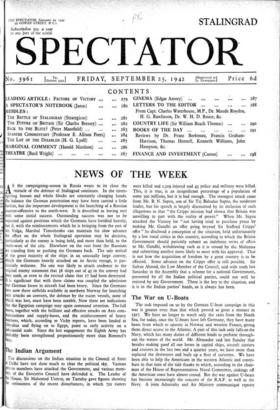he Indian Argument
The discussions on the Indian situation in the Council of State u Delhi have not done much to clear the political sky. Various Private members have attacked the Government, and various mem- bers of the Executive Council have defended it. The Leader of the House, Sir Mahomed Usman, on Tuesday gave figures showing the seriousness of the recent disturbances, in which 721 rioters were killed and 1,219 injured and 43 police and military were killed. This, it is true, is an insignificant percentage of a population of some 30o millions, but it is bad enough. The strongest attack came from Mr. B. N. Sapru, son of Sir Tej Bahadur Sapru, the moderate leader, but his speech is largely discounted by its inclusion of such allegations as that " the Cripps mission had shown that Britain was unwilling to part with the reality of power." When Mr. Sapru attacked the Viceroy for " not having tried to purchase peace by making Mr. Gandhi an offer going beyond Sir Stafford Cripps' offer " he disclosed a conception of the situation, held unfortunately by a few vocal critics in this country, according to which the British Government should patiently submit an indefinite series of offers to Mr. Gandhi, withdrawing each as it is vetoed by the Mahatma and submitting another more likely to meet with his approval. That is not how the acquisition of freedom by a great country is to be effected. Some advance on the Cripps offer is still possible. Sir Sultan Ahmed, the Law Member of the Council, said with truth last Saturday in the Assembly that a scheme for a national Government, presented by all the Indian political parties, could not well be resisted by any Government. There is the key to the situation, and it is in the Indian parties' hands, as it always has been.


























